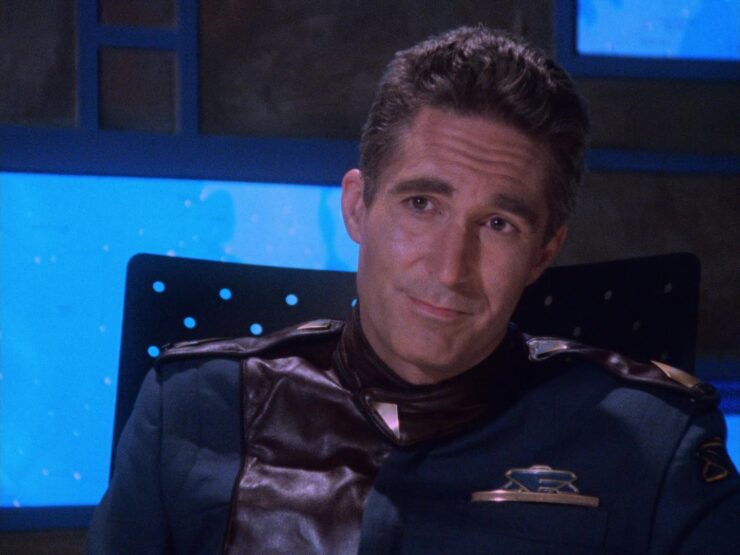Babylon 5 First Season
Original air dates: February 1993 – October 1994
Executive producers: Douglas Netter, J. Michael Straczynski
It was the dawn of the third age… We’re introduced to Babylon 5, stated in voiceover to be the last of the Babylon stations, designed to foster peace among the various nations of the galaxy. Owned and administrated by the Earth Alliance, the station CO is Commander Jeffrey Sinclair, whose posting was a condition imposed by the Minbari Alliance, who helped pay for the construction of the fifth station. The first three all were sabotaged, and the fourth disappeared into a time vortex. (B5 encounters B4 on its temporal journey at one point, and are able to rescue the crew, at least, though the mysterious Zathras and future iterations of Sinclair and Minbari Ambassador Delenn are also present.)
The ruling council of B5 includes Sinclair, Delenn, Vorlon Ambassador Kosh, Centauri Ambassador Londo Mollari, and Narn Ambassador G’Kar. The latter two are constantly at each others’ throats, as the two nations have a fraught history. The Narn used to be a subject species of the Centauri Republic, but these days the now-independent Narn Regime is ascendant and the Centauri are in decline.
Kosh’s arrival on the station is met with an assassination attempt, seemingly by Sinclair, though the true culprit turns out to be a Minbari with fancy disguising tech. Two of the station personnel (a doctor and a telepath) who examine the unconscious Kosh after he’s attacked (who are among the few non-Vorlon who have seen what a Vorlon really looks like) are immediately transferred off the station, one to work directly with the president’s office. Kosh, meanwhile, spends the entire season being mysterious, uninvolved (except when the plot needs him to be, anyhow), enigmatic, and prophetic.
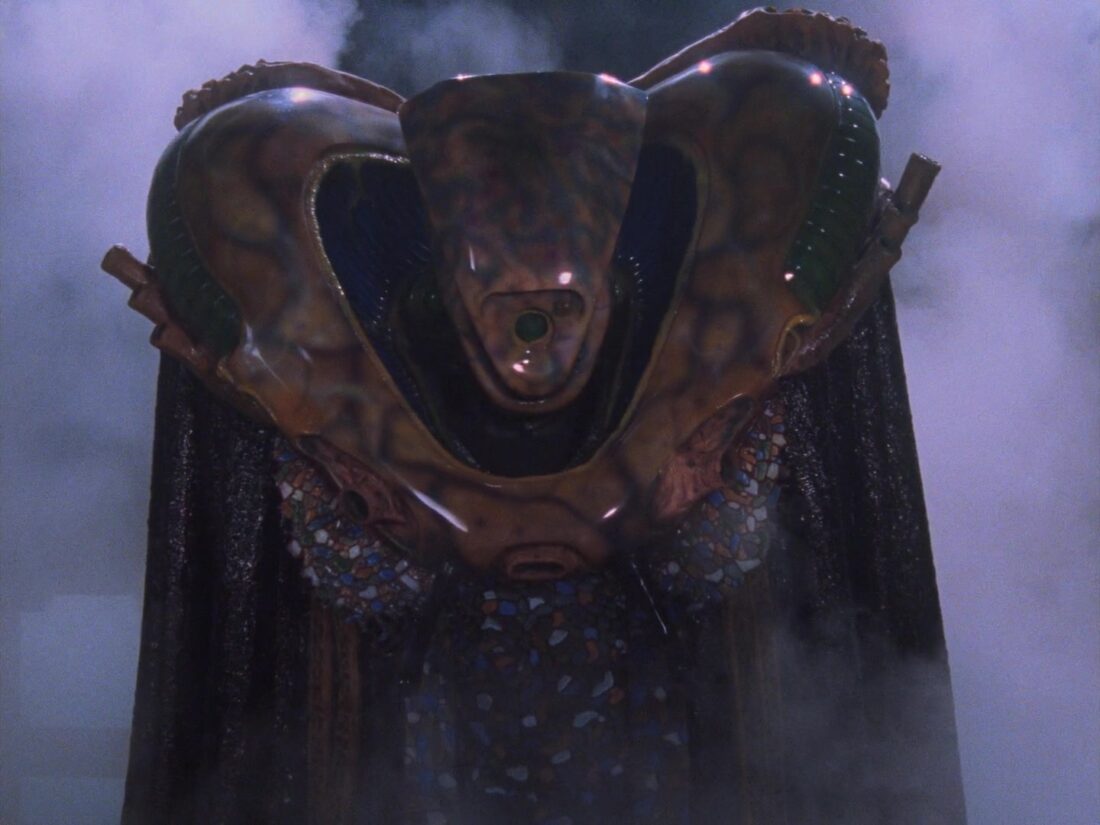
A man named Morden, who represents the interests of some powerful, shadowy (ahem) figures comes to the station asking each of the ambassadors what they want. He likes the answer he gets from Mollari best, and so he does the Centauri a couple of favors—retrieving an ancient artifact on Mollari’s behalf from raiders working in concert with another Centauri with designs on usurping the emperor’s throne, with the Shadows killing the latter. Later, the Shadows wipe out a Narn outpost in disputed space, giving Mollari credit for it.
A presidential election on Earth results in Luis Santiago being re-elected president, with Morgan Clark as his vice president. There are reports that Psi Corps endorsed Clark specifically, which violates their charter. A renegade telepath named Jason Ironheart comes to the station with stories of being experimented upon (he himself transforms to a non-corporeal state) and Psi Corps’ increasing influence in EarthGov.
Sinclair himself is targeted by elements of EarthGov, with two agents ENTERING HIS BRAIN to find out what happened to him at the Battle of the Line that ended the Earth-Minbari War (Sinclair himself has a twenty-four-hour memory gap from that time), and later a military investigation regarding his actions as CO of the station.
Second-in-command Susan Ivanova’s father grows ill and dies, and she struggles with grief. Chief medical officer Dr. Stephen Franklin is reunited with an old friend who turns out to be doing dodgy (and dangerous) archeology, and he also comes into conflict with the religious wishes of an alien family he’s treating. Security chief Michael Garibaldi is only occasionally successful at keeping the station secure, has some awkward reunions with two different women from his past, and gets shot in the back by one of his subordinates when he uncovers a conspiracy to assassinate Santiago (which succeeds).
Several of Delenn’s old friends visit the station. One is targeted by xenophobic humans, another gets to become the caretaker of the great machine on the planet B5 orbits. Delenn herself—who has secretly been a member of the powerful Grey Council—refuses a promotion to head of the council, which results in her being removed from it. Following that, she undergoes a rather radical transformation, the results of which won’t be known until next season…
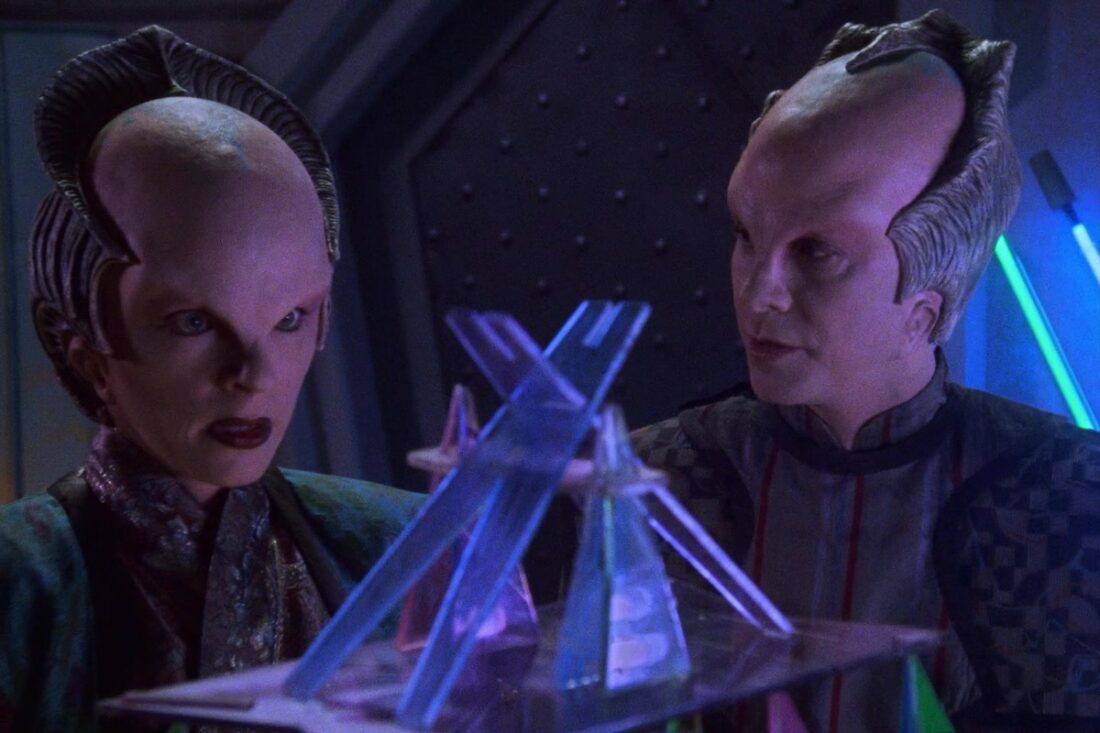
Favorite Nothing’s the same anymore. From “Deathwalker”: Sinclair has to navigate some delicate political waters, trying to balance his orders with the greater good. He might have succeeded, too, but for the unexpected no vote from the Minbari and the unexpected homicide from the Vorlons.
Favorite Ivanova is God. From “TKO”: During the shiva, Ivanova tells the story of how her father took her to see a writer named Kasherev, whom she greatly admired, at the age of 13. Andrei didn’t think much of him, but barely teenaged Ivanova insisted and whined and eventually convinced him to take her to Kasherev’s talk. Ivanova had a question for him that she’d been refining and rehearsing for ages. However, when she asked it, Kasherev belittled her question and her as a “bourgeois twit barely out of diapers” and refused to answer it. Andrei then stood up and rebuked Kasherev, saying that if he wasn’t a pacifist, he’d horsewhip him through the streets of St. Petersberg for being so rude to his daughter. After they left, Andrei said that he thought her question was excellent.
Favorite The household god of frustration. From “Midnight on the Firing Line”: Garibaldi is, it turns out, a Daffy Duck fan. Despite this, he never once tells Mollari that he’s despicable…
Favorite If you value your lives, be somewhere else. From “Grail”: We get the first mention of different Minbari castes, with Delenn and Lennier explaining that the Minbari Federation consists of the Religious Caste and the Warrior Caste. (The Worker Caste will be established later, and the fact that the workers aren’t mentioned by a pair of politicians is, well, not surprising…)
Favorite In the glorious days of the Centauri Republic… From “A Voice in the Wilderness, Part I”: Mollari sees Garibaldi being all despondent crying into his water in the Zocalo, so he cheers him up with the story of an exotic dancer he saw perform whom he shortly thereafter married.
Mollari also is apparently completely bumfuzzled by the human song known as “The Hokey Pokey,” as he is having tremendous trouble determining how, exactly, that’s what it’s all about…
Favorite Though it take a thousand years, we will be free. From “Deathwalker”: G’Kar is willing to ask Na’Toth to put off her blood oath long enough for it to benefit the Narn people. He is not willing to murder Na’Toth to benefit the Narn people. Good to know that there’s a line…
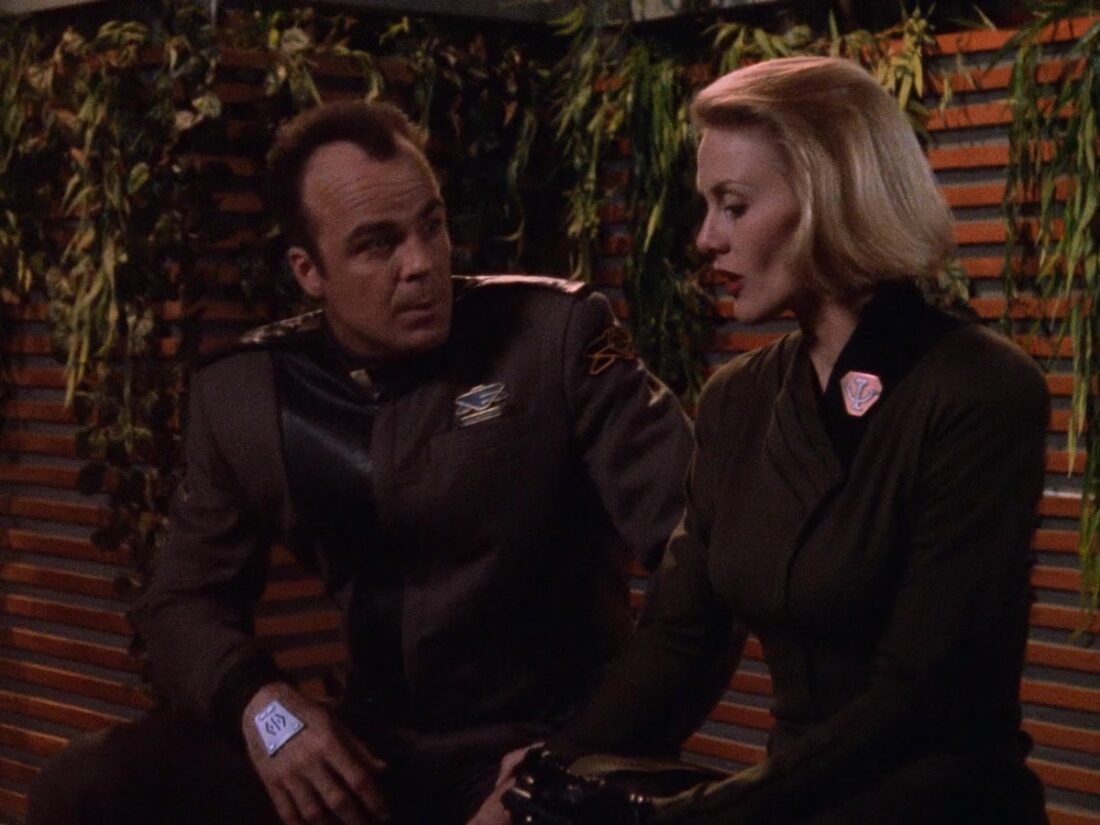
Favorite We live for the one, we die for the one. From “Babylon Squared”: The concept of “the one,” which will become very important over the course of the franchise, is introduced here, and Zathras claims at one point that he will live for the one and, if needs be, die for the one, a phrase that will (to say the least) recur.
Favorite The Corps is mother, the Corps is father. From “Eyes”: Grey is actually an ethical and decent Psi Corps representative, which makes him something of a rarity.
Favorite The Shadowy Vorlons. From “Believers”: The Onteen think that Kosh’s experiences of being operated on without his consent means he’ll be sympathetic to their cause. They are hilariously incorrect.
Favorite Looking ahead. From “Babylon Squared”: Oh, where to even begin?
Let’s start with the flashforward that we know can’t happen: Sinclair and Garibaldi at the eve of the destruction of B5 while it’s being overrun by, um, something. This can’t happen for two reasons: Sinclair will wind up leaving the cast at the end of the first season and won’t be around for the destruction of B5 many years hence (which will happen much differently anyhow); and Jerry Doyle will have long since lost all his hair by the time this flashforward would take place. (Sorry, but I always find it hilarious that with all the planning done with this show, nobody took male-pattern baldness into account…)
In addition, we see a very old Sinclair in the EVA suit talking to an off-camera Delenn. That half of the story was probably originally intended to be much later in the series’ run, though instead it’ll be in the “War Without End” two-parter. The reasons for Delenn being off-camera will be clear in the early episodes of season two.
When Zathras first sees Sinclair, he seems to recognize him, then sits back down and says, “not the one.” This will also be explained in the “War Without End” two-parter.
Delenn’s declaration that she’ll never set foot in the Grey Council chambers ever again will prove to be less than prophetic.
Ivanova jokes that next time B4 appears, she’s gonna go and Garibaldi will stay behind, which comes to pass in “War Without End.”
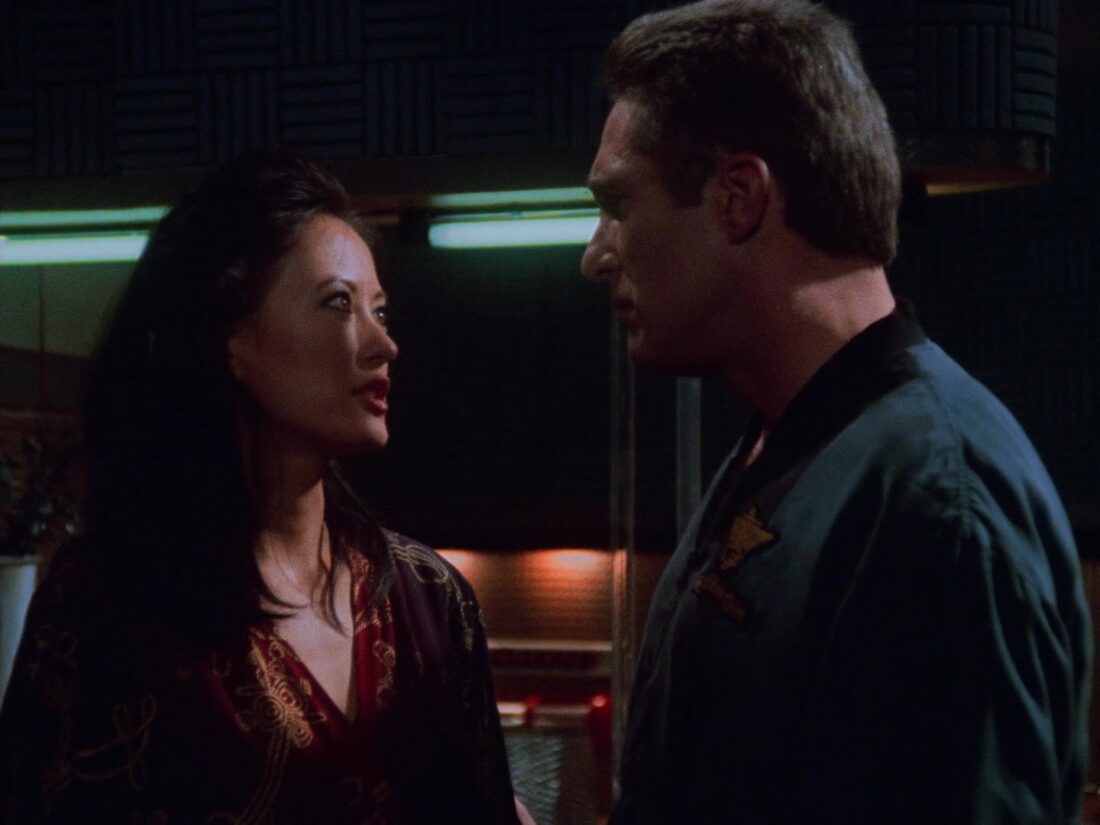
Favorite No sex, please, we’re EarthForce. From “The Parliament of Dreams”: Sinclair and Sakai progress to the on-again phase of their on-again/off-again relationship. It’s established that, some time since “The Gathering,” Sinclair and Sykes broke up, which Sinclair credits to his refusing to resign his commission and go into business with her, as she requested in that episode.
In addition, G’Kar’s proclivity for human women, hinted at in “The Gathering,” is seen twice here, once in Na’Toth’s dialogue, once when Garibaldi finds a human woman’s panties in G’Kar’s couch.
Favorite Welcome aboard. Several recurring regulars obviously make their first appearance this season: Aki Aleong as Hidoshi, Kent Broadhurst as Krantz, Macaulay Bruton as Jack, Ardwight Chamberlain as the voice of Kosh, the great Tim Choate as Zathras, Joshua Cox as Corwin, David L. Crowley as Welch, Maggie Egan as an ISN reporter, Denise Gentile as Hampton, Paul Hampton as a never-named senator, Patricia Healy as Cramer, the great Walter Koenig as Bester, Damian London as a never-named Centauri official, Curt Lowens as Varn, Gary McGurk as Clark, Julia Nickson as Sakai, Jim Norton as Wellington, Robert Phelan as Ivanova’s Dad, José Rey as Delvientos, William Sanderson as Deuce, Robert Silver as Reno, Louis Turrenne as Draal, Fabiana Udenio as Adira, John Vickery as Neroon, and the great Ed Wasser as Morden.
Patricia Tallman is one of four people who appear in “The Gathering” intending to be a regular, but who is replaced for the first season proper; Tallman, however, is the only one of those four who will return, though it won’t happen until next season.
Some great actors in one-off guest shots: Tom Booker (“Grail”), Katy Boyer (“By Any Means Necessary”), Michael Paul Chan (“The War Prayer”), the great Jeffrey Combs (“Eyes”). Robin Curtis (“Deathwalker”), the great Sarah Douglas (“Deathwalker”), John Fleck (“The Gathering”), Gerritt Graham (“Signs and Portents”), Nancy Lee Grahn (“The War Prayer”), Jim Ishida (“A Voice in the Wilderness, Part I”), Jonathan Charles Kaplan (“Believers”), Thomas Kopache (“The Parliament of Dreams”), the great June Lockhart (“The Quality of Mercy”), David McCallum (“Infection”), Danica McKellar (“The War Prayer”), Greg McKinney (“TKO”), Christopher Neame (“And the Sky Full of Stars”), Soon-Teck Oh (“TKO”), Fredi Olster (“Signs and Portents”), Tricia O’Neil (“Believers”), Clive Revill (“Born to the Purple”), Mark Rolston (“The Quality of Mercy”), W. Morgan Sheppard (“Soul Hunter”), and the great David Warner (“Grail”).
But my favorite guest of this entire season is the late great Theodore Bikel, absolutely brilliant as Rabbi Koslov in “TKO.”
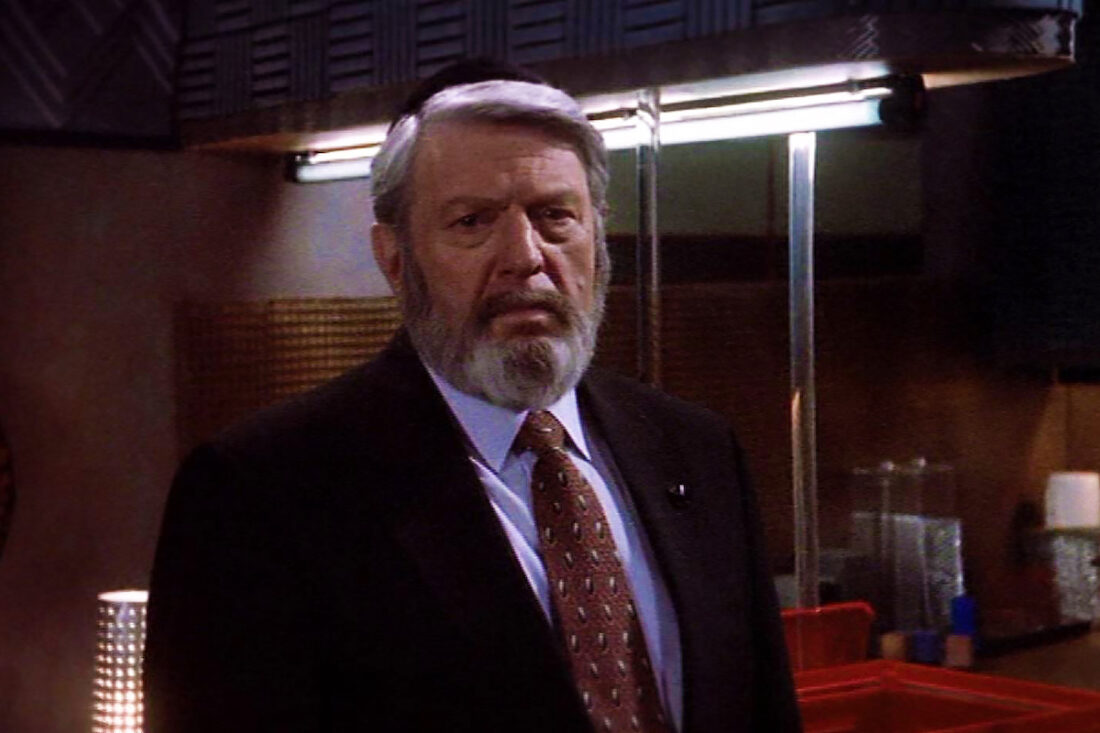
Favorite Trivial matters. Probably the one for “And the Sky Full of Stars,” only because of all the fun newspaper headlines…
Favorite The echoes of all of our conversations. From “The Gathering”:
“There was a time when this whole quadrant belonged to us! What are we now? Twelve worlds and a thousand monuments to past glories—living off memories and stories, and selling trinkets. My God, man—we’ve become a tourist attraction. ‘See the great Centauri Republic, open 9 to 5, Earth time.’”
—Mollari, lamenting to Garibaldi
The name of the place is Babylon 5. “Why Babylon 5?” Through the first few years of the 1990s, J. Michael Straczynski spent a lot of time online on the GEnie and CompuServe online forums and on Usenet promoting this show he was developing called Babylon 5. His promises were understandably hyperbolic—he was trying to market his show, after all—but that hype led to some outsized expectations. This, allegedly, was going to be the most scientifically accurate science fiction show ever, it was going to have an overarching plot that would run the entire five years of the show, it would take risks, and all kinds of other stuff.
With all that buildup, it’s hard to view the actual first season of the show that aired as anything but a massive disappointment.
There are bits and pieces of the great show that would eventually materialize, hints of some of the wonderful things to come. But what showed up onscreen in February 1993 and between January and October of 1994 was a series of flawed TV episodes wracked with clumsy scripting, mediocre acting, and an unexpected amount of rubber science (from telepathy to “life energy” being transferred to an inconsistent understanding of the distances of space).
There’s an old saying that the fish stinks from the head down. When you’ve got an ensemble cast, the head of that ensemble is crucial to the success of the show. One of the reasons why shows like M*A*S*H and Hill Street Blues and Star Trek: The Next Generation were so successful is due to the strong charisma of, respectively, Alan Alda, Daniel J. Travanti, and Sir Patrick Stewart.1
Michael O’Hare, alas, is not up to that standard, and it truly affects the entire show. (How much so becomes apparent once his replacement is introduced at the top of season two, which we’ll get to next week.) O’Hare’s talents were much better suited to being a member of the ensemble, not the leader of it—I’ve been saying for three decades that he would’ve been much better playing Garibaldi—and that had a deleterious effect on the entire show. It doesn’t help that the scripts keep hammering home how important Sinclair is, but the actor never brings the gravitas that the writing insists he has.

The actor had his moments, though. This rewatch reminded me of his strong performances, particularly in “By Any Means Necessary” and “And the Sky Full of Stars.” (It also reminded me of his weaker entries, like “Eyes” and “The Gathering.”)
However, his shortcomings are indicative of one of the season’s biggest flaws, which is making the humans interesting. This infects, not just the main cast, but the guest cast as well.
Garibaldi is a walking, talking cliché, the maverick cop who plays by his own rules and pisses off the bosses and all that—he’s even an alcoholic and has broken relationships in his past! Plus we’ve got the love for twentieth-century ephemera that seemingly every science fiction show feels the need to insert so they can put contemporary references in….
Franklin and Winters get surprisingly little to do this season, and what we do get is not wonderful. The doctor comes across as an arrogant snot (I still think “Believers” should have ended with his resignation and censure by whatever Earth Alliance’s equivalent of the AMA is), and the telepath is mostly just a spectator to other stuff going on (“Mind War,” “Deathwalker,” “The Quality of Mercy”), when the show even bothers to remember she’s there.
And then we have the litany of human guest stars who are just horrible either as characters (“Infection,” “And the Sky Full of Stars,” “A Voice in the Wilderness, Part II”), as actors (“Survivors,” “By Any Means Necessary”), or both (“Mind War,” “The War Prayer,” “Eyes”).
The exception is Ivanova, whom Claudia Christian imbues with a delightfully snarky cynicism, as well as a level of self-reliance and inability to trust others that is well-ingrained by past experiences. But this tendency to make the human characters uninteresting, unsympathetic, or both makes it hard for the viewer to take any interest in Earth Alliance generally. And what we do see is mostly creepy and corrupt (the less-than-helpful senators we see in “The Gathering,” “Midnight on the Firing Line,” “Deathwalker,” and “Chrysalis,” the insidiousness of Psi Corps as seen most overtly in “Mind War,” the skeevy representatives of EarthGov and EarthForce that we meet in “By Any Means Necessary,” “And the Sky Full of Stars,” “A Voice in the Wilderness, Part II,” and “Eyes,” etc.). That combined with never having President Santiago on screen (not even when he visited the station in “Survivors”) mutes the impact of his being assassinated in “Chrysalis,” as there’s no personal hook there to make us care about the person and not enough of a dramatic hook over the past season to make us care about the office.
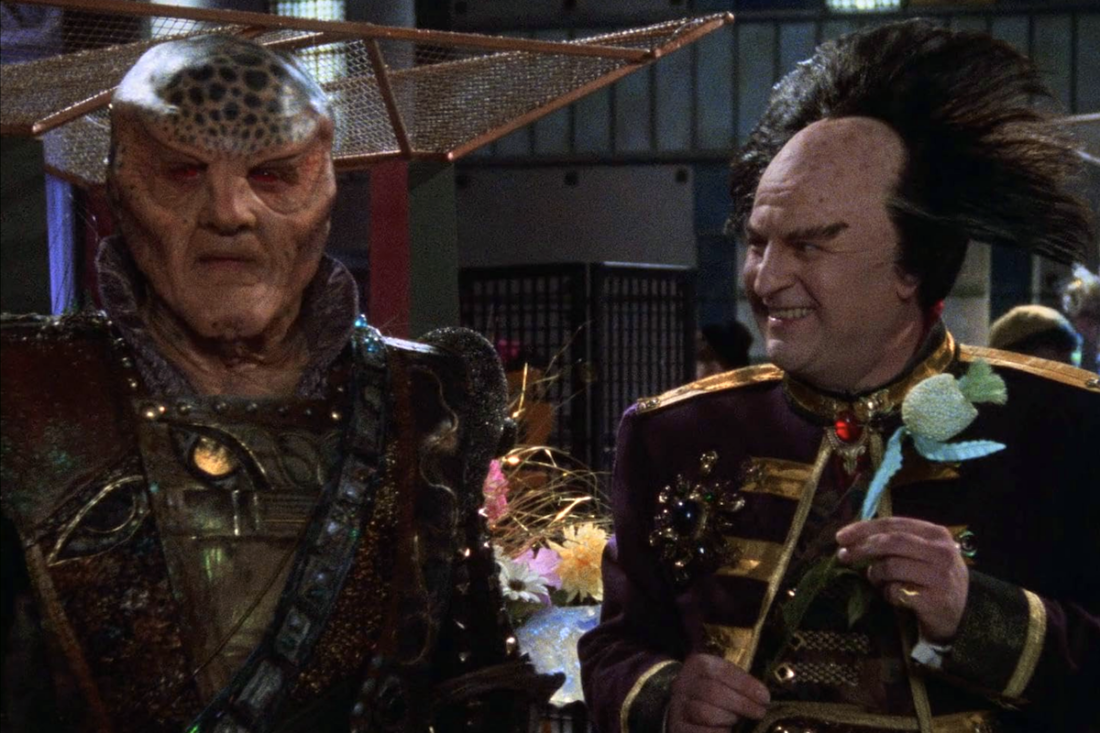
It’s in the non-humans that the show truly shines. Mira Furlan’s Delenn, Andreas Katsulas’ G’Kar, and especially Peter Jurasik’s Mollari are all magnificent. Katsulas is not always well served by the writing, as he’s too often relegated to the mustache-twirling villain role, though he starts to climb out of that in “Mind War” and “By Any Means Necessary.” But all three of them provide tremendous depth of character and purpose in both the writing and acting that serves the show extremely well. Delenn and Mollari in particular are fascinating. The former is charming and sweet, but that velvet glove covers an iron fist of ruthlessness and deception. The latter comes across initially as a comic figure with a tinge of tragedy, but he quickly proves to have much more depth, as the tragedies start to come to the fore, and at the season’s end he finds himself trapped in a Faustian bargain that will direct the course of galactic politics forward.
Still, despite its many flaws, the foundation of a great show is laid here.
Next week: “Points of Departure.”
- I chose those three deliberately, as all of them did things that B5 is sometimes inaccurately credited with pioneering, from M*A*S*H’s closing a season with a surprise death in 1975, to Hill Street doing story arcs throughout its run from 1981-1987, to TNG doing an episode where the lead is mentally tortured in 1992.










